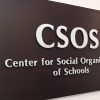First established in 1966 by Johns Hopkins sociologists James Coleman and Edward McDill in the wake of Coleman’s landmark “Coleman Report” on the American educational system, the Center for the Social Organization of Schools (CSOS) has, for five and a half decades, successfully used research to develop programmatic solutions to the many challenges educators face.
From 1976 to 2006, the Center broadened its focus under the successive (and often joint) leadership of McDill, John Holland, and Jim McPartland, who had been Coleman’s graduate student. Doug Mac Iver and Bob Balfanz, who had held leadership roles since 1992 and 2002 respectively, became co-directors in 2006, commencing a fifteen-year run, while Joyce Epstein, who had provided leadership at the Center since the 1970s, became a co-director in 2013.
Director elections are held every four years, but clearly long terms of service are the norm. The esteemed troika of Epstein, Mac Iver, and Balfanz has been in place at CSOS for the past decade. Change came on November 1, however, when Epstein and Mac Iver stepped back from day-to-day oversight of the Center and Steve Sheldon and Marcia Davis, both associate professors, were unanimously elected to join Balfanz in co-directing the Center.
“Joyce and I are looking forward to having a little more time to focus on our current projects without having quite so many administrative duties and meetings,” Mac Iver wrote in a departmental email. “Thank you, Bob, Steve, and Marcy for agreeing to lead CSOS into its bright future.”
The Center bills itself as a cadre of sociologists, psychologists, social psychologists, and educators who conduct programmatic educational research, backed by a team of experienced educational practitioners, communications professionals, and project support staff who develop curricula and provide technical assistance to schools to broaden application of the Center’s research. Long-term research, development, and dissemination efforts led by CSOS faculty under its auspices include (among others) the Everyone Graduates Center, Early Learning, and National Network of Partnership Schools.
Sheldon and Davis, both familiar faces at the Center, will immediately begin to take on administrative duties at CSOS, but they will also bring new perspectives, says Balfanz.
“It is an evolution. This younger generation of leaders, with children who are still in school, will help set the research agenda going forward and help disseminate information about our programs,” he explains.
Over the years, CSOS has prided itself on finding bright spots in the educational system and developing evidence-based programs and policy approaches to improve American education through greater social engagement across the spectrum of parties involved, whether teachers, administrators, students, families, or invested community organizations.
The need for that engagement and for those stakeholders to come together, a key finding of Coleman’s famous report in the 1960s, was never more apparent than during the COVID-19 pandemic this past year, say Sheldon, a researcher who has focused attention on the value of teacher visits to students’ homes to improve academic performance for many at the margins.
Despite the apparently bleak background, particularly for underserved communities, the shift to online learning brought about by the pandemic has surprisingly created some silver linings for educators, Sheldon notes.
“Our job now is to understand and maximize those silver linings to achieve some good things for kids who might otherwise fall by the wayside,” he says. “I’m hoping that this move into leadership might help us build upon that emerging work.”
Davis is an educational psychologist by training who, like Sheldon, originally joined CSOS as a post-doctoral scholar. Now an associate professor, she focuses her research on student engagement and motivation to improve performance, particularly in reading.
“We will continue the legacy of this important center, but also build upon it and perhaps take it in new direction through new grants and targeted hiring that ensure the Center for Social Organization of Schools is around another five decades from today,” Davis said.

